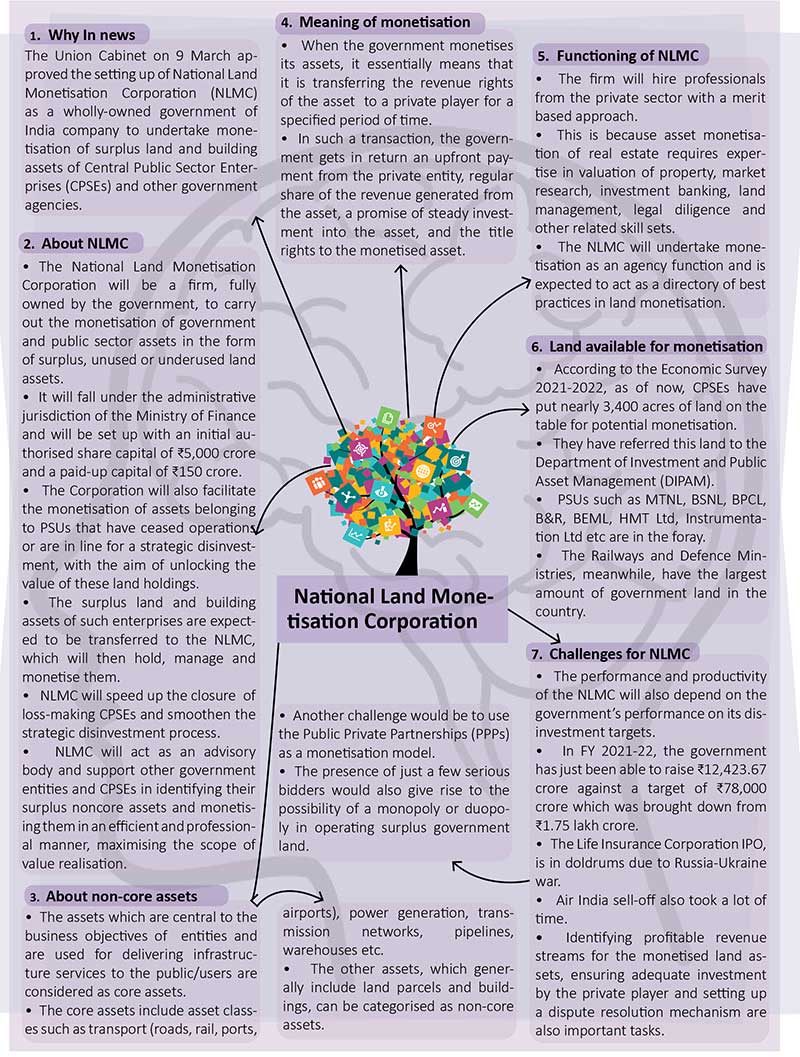Brain-booster
/
08 Apr 2022
Brain Booster for UPSC & State PCS Examination (Topic: National Land Monetisation Corporation)

Why in news?
- The Union Cabinet on 9 March approved the setting up of National Land
Monetisation Corporation (NLMC) as a wholly-owned government of India
company to undertake monetisation of surplus land and building assets of
Central Public Sector Enterprises (CPSEs) and other government agencies.
About NLMC
- The National Land Monetisation Corporation will be a firm, fully owned
by the government, to carry out the monetisation of government and public
sector assets in the form of surplus, unused or underused land assets.
- It will fall under the administrative jurisdiction of the Ministry of
Finance and will be set up with an initial authorised share capital of
₹5,000 crore and a paid-up capital of ₹150 crore.
- The Corporation will also facilitate the monetisation of assets
belonging to PSUs that have ceased operations or are in line for a strategic
disinvestment, with the aim of unlocking the value of these land holdings.
- The surplus land and building assets of such enterprises are expected to
be transferred to the NLMC, which will then hold, manage and monetise them.
- NLMC will speed up the closure of loss-making CPSEs and smoothen the
strategic disinvestment process.
- NLMC will act as an advisory body and support other government entities
and CPSEs in identifying their surplus noncore assets and monetising them in
an efficient and professional manner, maximising the scope of value
realisation.
About non-core assets
- The assets which are central to the business objectives of entities and
are used for delivering infrastructure services to the public/users are
considered as core assets.
- The core assets include asset classes such as transport (roads, rail,
ports, airports), power generation, transmission networks, pipelines,
warehouses etc.
- The other assets, which generally include land parcels and buildings,
can be categorised as non-core assets.
Meaning of monetisation
- When the government monetises its assets, it essentially means that it
is transferring the revenue rights of the asset to a private player for a
specified period of time.
- In such a transaction, the government gets in return an upfront payment
from the private entity, regular share of the revenue generated from the
asset, a promise of steady investment into the asset, and the title rights
to the monetised asset.
Functioning of NLMC
- The firm will hire professionals from the private sector with a merit
based approach.
- This is because asset monetisation of real estate requires expertise in
valuation of property, market research, investment banking, land management,
legal diligence and other related skill sets.
- The NLMC will undertake monetisation as an agency function and is
expected to act as a directory of best practices in land monetisation.
Land available for monetisation
- According to the Economic Survey 2021-2022, as of now, CPSEs have put
nearly 3,400 acres of land on the table for potential monetisation.
- They have referred this land to the Department of Investment and Public
Asset Management (DIPAM).
- PSUs such as MTNL, BSNL, BPCL, B&R, BEML, HMT Ltd, Instrumentation Ltd
etc are in the foray.
- The Railways and Defence Ministries, meanwhile, have the largest amount
of government land in the country.
Challenges for NLMC
- The performance and productivity of the NLMC will also depend on the
government’s performance on its disinvestment targets.
- In FY 2021-22, the government has just been able to raise ₹12,423.67
crore against a target of ₹78,000 crore which was brought down from ₹1.75
lakh crore.
- The Life Insurance Corporation IPO, is in doldrums due to Russia-Ukraine
war.
- Air India sell-off also took a lot of time.
- Identifying profitable revenue streams for the monetised land assets,
ensuring adequate investment by the private player and setting up a dispute
resolution mechanism are also important tasks.
- Another challenge would be to use the Public Private Partnerships (PPPs)
as a monetisation model.
- The presence of just a few serious bidders would also give rise to the
possibility of a monopoly or duopoly in operating surplus government land.







